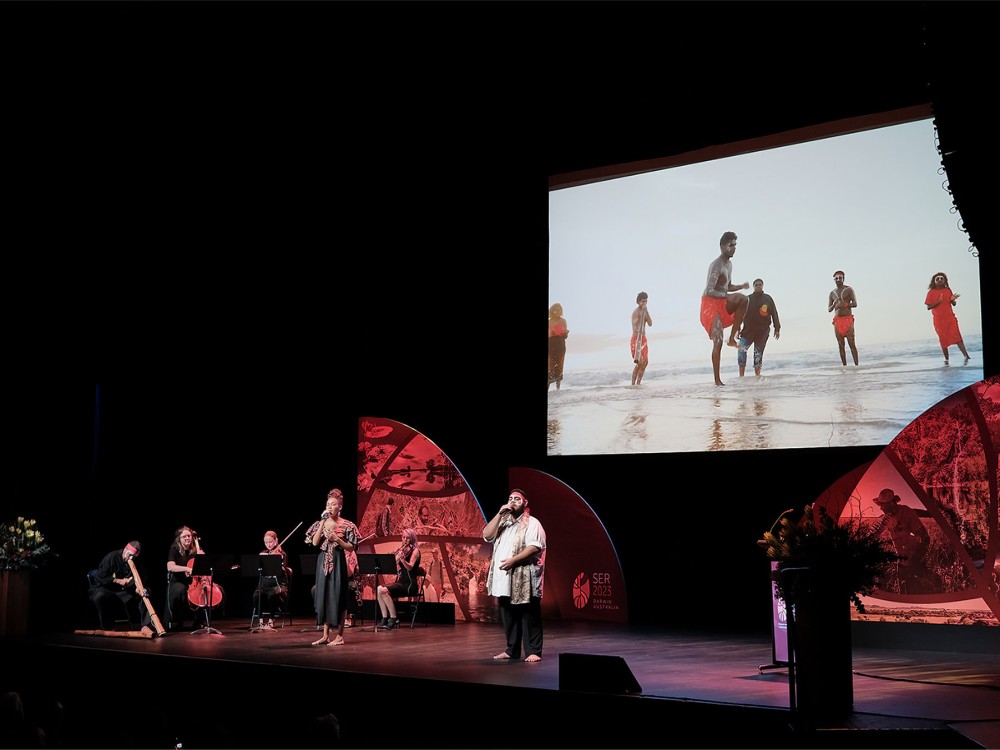Name: The 10th World Conference on Ecological Restoration (SER2023)
Destination: Darwin, Northern Territory (NT), Australia
Venues: Darwin Entertainment Centre , DoubleTree by Hilton Hotel Esplanade Darwin & the Hilton Garden Inn Darwin
Pax: 990 delegates from 80 countries
About the event
The Society for Ecological Restoration (SER) is an international non-profit organisation which advances the science, practice and policy of ecological restoration, with the aim of sustaining biodiversity, improving resilience in a changing climate and re-establishing an ecologically healthy relationship between nature and culture. SER’s biennial World Conferences are the premier meeting point for those interested in ecological restoration and management.
Delegates came from sectors such as natural and social sciences, environmental engineering, urban and regional planning, public policy, landscape architecture and natural resource management and included sector experts, academics, scientists, researchers, students, practitioners and policymakers.
Half-day and full-day training courses were held prior to the official commencement of the conference and an invitation-only Global Forum was also staged, along with a UN Decade Advisory Board meeting. Over the four days of the conference, 750 concurrent sessions and symposia, workshops, field trips, plus poster and training sessions explored restoration issues across all continents and ecosystems.
Why the NT?
SER received strong support from Northern Territory Business Events, and also Tourism Australia through its Business Events Bid Fund Program. SER2023 was planned in cooperation with the Society for Ecological Restoration Australasia (SERA) a neutral, independent, non-profit organization that connects restoration industries across Australasia.
Twelve field trips were arranged pre and post conference, with delegates visiting innovative restoration projects being undertaken in the NT such as Kakadu National Park, Litchfield National Park, the town of Katherine and the iconic Central Australia locations of Uluru, Kata Tjuta and Kings Canyon.
Triumphs
The Darwin conference was a sell-out, highlighting the growing momentum of the restoration movement globally and also the appeal of the host destination. Conference speakers emphasised the importance of encouraging governments to realign policies and funding to proactively support inclusive, participatory restoration projects. The Darwin Call to Action arising from the conference highlighted the urgent need for effective, standards-based restoration worldwide.
A Make a Difference Day enabled delegates to participate in a hands-on restoration activity experience at the 41-hectare McMinns Lagoon Reserve, approximately 35 kilometres south-east of Darwin, where delegates assisted with plantings and other ecological restoration activities. The Reserve comprises 41 hectares of wetlands fringed with open woodland, closed paperbark forest and grassland – it is an area of significant environmental, social and cultural value to the Larrakia People and local residents.
Special NT elements
The Welcome to Country delivered by an Aboriginal Elder of the Larrakia People, the traditional owners of the Darwin region, set the stage for what was to be the world’s largest global meeting of restoration experts.
The conference logo was inspired by the mangrove leaf, chosen for the species’ adaptability and importance for ecological health and ecosystem services and its ochre colour scheme honoured the strong Indigenous culture of the Northern Territory.
A special cultural feature of the conference were the Yarning Circles – these traditional discussion circles, important within Aboriginal and Torres Strait Islander culture, enable learning from a collective group, the building of respectful relationships, and preservation and passing on of cultural knowledge.
In their words
Organisers made special mention of how the NT’s cultural elements had contributed to the event.
“The conference was very well received by conference delegates, the board, and staff of SER. The strong Aboriginal connections in Darwin made for some very valuable conversations about indigenous-led work happening in Darwin, the Northern Territory, Australia, and other areas around the world.”
Tony Ballard, CMP
Meetings and Education Manager
Society for Ecological Restoration (SER)

A Larrakia cultural performance at the SER2023 World Conference in Darwin
